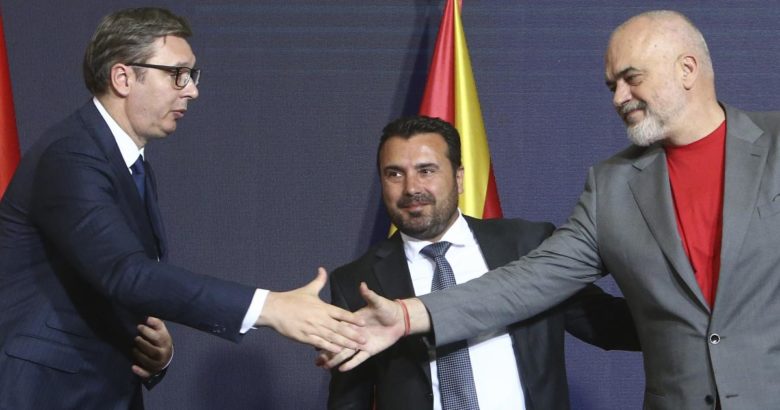‘Open Balkan’ initiative wants to scrap border controls between Balkan countries

In July the leaders of Albania, North Macedonia, and Serbia announced that they would be abolishing border controls between their countries by the year 2023. This news could be a gamechanger for businesses from all over the Balkans and would be especially important for startups.
The Open Balkan initiative originally dubbed the “mini-Schengen”, is aiming to replicate the Schengen zone by making the flow of people, goods, and capital free as in other European countries. Their plan is to eventually spread this initiative across the rest of the Balkans.
Of course, there are those who criticize the initiative, warning it could become a replacement for EU membership. This fear is not without reason, considering that all three countries have been on the waiting list for joining the EU for years. However, businesses with limited access to the European market would greatly benefit from such an arrangement.
Co-founder of Startup Macedonia Nina Nikolovich has shared for BalkanInsight that while individual markets in the Balkans have been good for testing service or product, Startup Macedonia has always encouraged its clients “to think globally and focus on going to other markets as well.”
“An initiative like Open Balkan is something that will accelerate the process of getting faster market validation in these countries,” commented Nikolich. “It will support collaboration between founders, organisations, investors, institutions.”
Prior to joining the EU
A unified Balkan market is nothing new. The idea dates back to 2019. However, for various reasons winning over Kosovo, Montenegro, and Bosnia and Herzegovina has been a problem. This is mainly due to the fact they desire to join the EU, just like North Macedonia, Serbia, and Albania.
People like Aleksandar Klashninovski, the CEO of Brainster Next, see Open Balkan as invaluable experience prior to joining the EU.
“It will give us access to a bigger talent pool, bigger sources of financing, we can become an attractive investment area for the big foreign corporations etc,” he said. “Although the end objective stays the same – joining the EU and European Economic Area – Open Balkan would be very useful for all three countries in their journey to the EU as it will bring together the resources of three similar economies, with similar levels of economic development and similar challenges.”
Vice-president of Serbia’s Bitcoin Association Arvin Kamberi is of a similar opinion, seeing the benefits of the initiative.
“This agreement will introduce a joint market of 10+ million people which brings opportunities for company growth,” Kamberi told BIRN in an email. “Later on, larger regional companies might better compete on global markets and prepare better for the 40 times bigger EU open market. Anyhow, companies would still need to invest more in customised local content being that, even geographically close, the three regional markets are still quite different,” he said, citing linguistic differences for one.
Hub for innovation
The initiative has the support of South Central Ventures, which mainly invests in tech startups in the region.
“Firstly, it can increase interconnectedness and cooperation between teams and individuals (including free flow of capital and workforce) across these countries,” the company has commented, citing Pristina-based Labbox as an example, which supplies science, technology, engineering and mathematics games for children.”
“Recent developments in Croatia, such as the two unicorn companies Infobip and [Croatian car manufacturer] Rimac, had a spillover effect on Serbia with VC [Venture Capital] funds such as [US-based] Accel Partners, [Berlin-based] Earlybird and [Berlin-based] Point Nine investing directly in the early stages. The Open Balkan initiative can help accelerate the process and put North Macedonia and Albania on the radar for these funds, too,” South Central Ventures said.
Even though the initiative is in its early stages, they have been looking at making innovation in the region a top priority, said Kosta Petrov, managing director at North Macedonia’s state Fund for Innovation and Technological Development, FITD.
“The issues that startups across the region are faced with are pretty much the same, and therefore it is better to work together on finding the right solutions,” Petrov said. “The idea is to make a pledge and to be able to use our instruments in a regional context, since for most startups the first markets are the domestic one and the regional one.”
Lack of faith in the initiative
Some are still skeptical of the potential benefits the initiative could bring to the region Albanian entrepreneur Gerion Treska, Chief business officer at Almotech, says that due to corruption and lack of competition, the only thing that will happen is international companies will hesitate from doing business in the region.
“I don’t believe that Open Balkan will have any major influence in the startup and business ecosystems in these countries,” said Treska. “Culturally speaking, regarding doing business, the focus is rarely towards the clients’ needs. We want to build things in the Balkans ‘for them’, because our people can’t use what we do, and there are too many bureaucracies. This needs to change in order to prosper and develop as a market.”
Treska says he believes more in entrepreneurs in the region.
“I believe in the entrepreneurial future of the region, not because of politics but because one day some bright-minded entrepreneurs will start to elevate the Balkans as one ecosystem made of puzzle pieces that work together for a wealthier and healthier society,” he said.
Startup expert Ergest Nako shares Treska’s opinion.
He said “Better initiatives from the respective governments and donors should be implemented so that startups will be able to better explore this new unified market. These initiatives should be coordinated, with the main goal to help the region, and not individual countries,” Nako added. “If we go with local initiatives, then we will start to have countries which will get advantages over the others.”
And what about EU accession, with some countries – on paper, at least – closer than others?
“We also must take into consideration what will happen if Serbia enters the EU before the other countries? Will this agreement still be in place?” Nako asked. “We are aware that not all of the Western Balkan countries are on the same track in their EU integration path.”





























